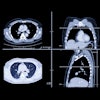
Artificial intelligence (AI) is being woven into the fabric of our everyday lives. Yet for some, AI still seeds concern that such technology might bring about a rise of the robots or will curtail jobs and have an adverse impact on humankind. In fact, recent news regarding Google's AI chatbot LaMDA having apparent consciousness and prejudice as it interacts with humans has further fueled some apprehensions.
 Morris Panner.
Morris Panner.Sensational headlines aside, there are incredible benefits to the use of AI. The technology has been widely adopted by those in finance, manufacturing, transportation, retail, e-commerce, and more. And while we're still lagging behind these sectors, healthcare, too, has started to integrate AI into workflows, with the past decade seeing dramatic improvements as a result of more machine learning and cloud computing.
In the healthcare AI market in particular, new projections expect the AI market -- which was pegged at $82.3 billion in 2020 -- to reach nearly $195 billion by 2030.
Discovering the full potential of AI in healthcare
Healthcare providers have had a front-row seat to the impact of AI. Applications of AI are helping to make their practices more efficient, addressing administrative tasks in the transition to value-based care, managing population health, and pulling real-time data to diagnose patients and plan treatments. Research with AI is even proving fruitful in providing new insights for genomics, biomarkers, and drug research and discovery, and it is even being used in specialized applications including pathology, ophthalmology, and radiology.
In my opinion, one of the most promising uses of AI in healthcare relates to medical imaging. AI is particularly useful for radiology, since technological advancements in 3D imaging and other scans are producing vast amounts of data that busy radiologists must review. Because AI is adept at recognizing complex patterns, it is perfectly suited to supplement human expertise in diagnosis and identification, risk assessment, segmentation, classification, evaluation of recurrence risk, and response to therapies.
For example, an article in Future Healthcare Journal examined how AI is transforming the practice of medicine. It noted that studies have demonstrated AI's ability to meet or exceed the performance of human experts in image-based diagnoses from several medical specialties including pneumonia in radiology.
None of this is to say that AI would replace radiologists. Far from it. AI, when properly deployed, holds the potential to free radiologists, allowing them to focus on higher-level diagnostic functions rather than mundane tasks.
Despite this promise, a recent survey of its members by the American College of Radiology found that only 30% of radiologists were using AI as part of their practice. Larger practices were the most likely to use AI to enhance interpretation, for conditions such as intracranial hemorrhage, pulmonary emboli, and mammographic abnormalities. Another 20% indicated that they were planning to adopt AI tools by 2025.
Patient expectations of AI in healthcare
Even though adoption of AI by radiology practices has been slower than expected, patient trust in the technology isn't a factor holding it back. In a recent study conducted by my company, 79% of surveyed healthcare consumers said that they trusted or were neutral about diagnosis from an AI-assisted radiologist. Furthermore, nearly two-thirds were comfortable with diagnosis based solely on AI, without radiologist input.
Those surveyed also believe that AI will play a major role in medical imaging in the future. About 60% expect AI to perform at least half of radiology services in the next five years, growing to three-quarters in the next two decades.
Healthcare consumers likely have a positive impression of AI in medical imaging due to their personal experiences with tech in daily life. AI plays an integral role, whether through the use of Alexa to control our houses, mapping apps to direct us efficiently, or even cybersecurity to protect us from fraud. For everyday consumers, it's easy to see how the real-time power of AI could translate well into their medical care.
Truthfully, patients stand to benefit greatly from the addition of AI in medical imaging. For example, AI can help radiologists prioritize urgent cases, like strokes, in which quick identification of the problem, accurate diagnosis, and rapid treatment are necessary for survival. AI also adds a layer of precision to the radiologists' personal expertise, helping to identify anomalies that may go unnoticed and providing additional decision support during busy times or overnight shifts.
Furthermore, AI can also be a valuable tool for monitoring patient anatomy over time to help providers understand changes that might impact future treatment decisions. The use of AI to manage large-scale screening and population health initiatives promises to bring down costs and improve outcomes through early detection and prioritization.
Acceptance of any new technology can be a challenge. It can be particularly hard in healthcare when both patients and providers are skeptical. Medical professionals, who rely on years of experience and expertise honed through traditional methods, are still slow to adopt AI. But with the understanding that AI is already being used in their care, patients have no reservations.
As AI matures -- whether it's for use in medical imaging or a myriad of other scenarios -- there's no doubt it will become an integral part of the healthcare experience in the future.
Morris Panner is the president of Intelerad Medical Systems, leading the company on delivering better care through improved technology. Morris served as CEO of Ambra Health from 2011 until its acquisition by Intelerad in 2021. Morris is an active voice in the cloud and enterprise software arena, focused on the services and healthcare verticals. He is a frequent contributor to business, healthcare, and technology publications. Previously, Morris built and sold an industry-leading business-process software company, OpenAir, to NetSuite (NYSE:N).
The comments and observations expressed are those of the author and do not necessarily reflect the opinions of AuntMinnie.com.



















